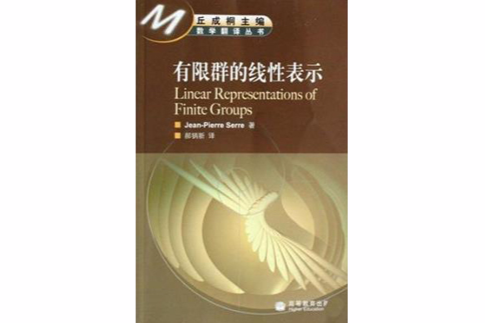《有限群的線性表示》是2008年世界圖書出版公司出版的圖書,作者賽爾。該書是一部介紹有限群線性表示的教程。
基本介紹
- 中文名:有限群的線性表示
- 別名:Linear Representations of Finite Groups
- 作者:(法國)賽爾 (Serre.J.P)
- 出版社:世界圖書出版公司
- 出版時間:2008年10月1日
- 頁數:170 頁
- 開本:24 開
- 裝幀:平裝
- ISBN:9787506292597
- 正文語種:英語

《有限群的線性表示》是2008年世界圖書出版公司出版的圖書,作者賽爾。該書是一部介紹有限群線性表示的教程。
《有限群的線性表示》是2008年世界圖書出版公司出版的圖書,作者賽爾。該書是一部介紹有限群線性表示的教程。內容簡介是一部介紹有限群線性表示的教程,作者是當今法國最突出的數學家之一,他對理論數學有全面的了解,尤以著述清晰、...
《有限群的線性表示》是1984年科學出版社出版的圖書,作者是(法)塞爾(J.P.Serre)。內容簡介 本書從表示論的最基本的內容入手,逐步深入,直到這方面最近代的成果.它深入淺出地介紹了有限群表示論的最主要的內容.全書共分三部分:...
《有限群和緊群的表示論》是1997年北京大學出版社出版的圖書,作者是丘維聲。作品目錄 序 前言 引言 第一章 群表示論的基本概念和Abel群的表示 1 群的線性表示的定義和例 2 從已知表示構造新表示的一些方法 3 不可約表示, 表示的...
《有限群的表示論》是一部為大學高年級本科生和低年級研究生編寫的教科書,內容主要涉及群表示論的各個方面。閱讀本書所需背景知識包括線性代數,群論、環論基礎知識,書中有意省略模理論,Wedderburn理論和張量積等內容,取而代之的...
《物理學中的群論(第三版)—有限群篇》是2005年科學出版社出版的圖書,作者是馬中騏。內容簡介 從物理問題中提煉出群的基本概念和群的線性表示理論,結合物理中常見的對稱變換群講解群及其子集的性質,和群表示理論,舉例說明群論方法在...
本書為求自成系統,在第一章用較大篇幅簡要地敘述了與群表示論有關的一些預備知識,特別是介紹了有限維代數的結構與表示理論。本書每節後都附有足夠多的習題幫助讀者理解與拓廣正文的內容。本書假定讀者已經熟悉線性代數理論,並具備...
《群的線性表示》是2010年世界圖書出版公司出版的圖書,作者是溫貝格(ErnestB.Vinberg)。內容簡介 《群的線性表示》以作者在莫斯科大學講演稿為藍本,主要目的是儘可能簡明、詳盡地將遇到的問題闡述清楚。書中全面展示有限群和緊群線性表示...
表示論是數學中研究表示的理論。對於一個數學體系A,從A到同類的(一般是“更具體的”)一個數學體系的保持結構的映射,稱為A的一個表示。其中主要有群的置換表示、群和結合代數的線性表示、有限群的線性表示、酉表示等等。表示論(...
若取,則緊緻群的表示均為完全可約的,對於一般的李群及群概形則複雜得多,完全可約與否通常與半單性有關。有限群表示論 設G是有限群,V是複數域 C上的有限維向量空間,GL(V)是V上全體可逆線性變換所組成的群。從G 映入GL(V...
3.4 群的線性表示的結構 4 abel群的不可約表示 5 非abel群的不可約表示的一些構造方法 5.1 表示的提升與分解 5.2 通過群的自同構的撓表示 5.3 逆步(contragredient)表示 第二章 有限群的不可約表示 1 群g的線性表示與群...
《群的表示和特徵標》是2017年科學出版社出版的圖書,作者是(英)戈登·詹姆斯(Gordon James)、(英)馬丁·李貝克(Martin Liebeck)。內容簡介 在本書的第2版中,我們採用現代觀點介紹有限群表示理論。在該版中我們對第1版作了...
G.格里斯用手算,從47·59·71=196883維的線性表示而得到F1。它有著良好的內在的幾何結構,並且有20個左右的零散單群作為它的子群,所以並不是什麼怪物,G.格里斯改稱它為“友好巨人”。研究有限單群的一般方法,可非常概括地歸結為...
1.5 群的直積 16 1.5.1 直積群 16 1.5.2 直積群的類 17 1.6 Cayley定理 17 參考文獻 19 習題1 19 第2章 有限群的表示理論 21 2.1 線性向量空間 21 2.1.1 線性向量空間的定義 21 2.1.2 線性相關與空間的維數...
《有限群表示中的對稱與對偶的幾個問題》是依託華中師範大學,由樊惲擔任項目負責人的面上項目。項目摘要 本項目以一般的對稱代數為主要框架,研究有限群表示中的對稱和對偶的幾個問題:一般對稱代數的冪等元與特徵標、與雙線性型的關係...
3.4.3 酉群 3.4.4 Suzuki-Ree群 3.4.5 例外單群 3.4.6 正交群 第4章 群的同階元型 4.1 小次數交錯單群 4.2 |e(G)|=2的群 4.3 |e(G)|=3的群 4.4 Thompson問題 4.5 有限群的平均階 4.5...
稱為正交表示。有限群在實數域上的任意的矩陣表示都等價於一個正交表示。正交變換 在線性代數中,正交變換是線性變換的一種,它從實內積空間V映射到V自身,且保證變換前後內積不變。因為向量的模長與夾角都是用內積定義的,所以正交變換...
線性群(linear group)是同構於一個域 K 上矩陣群的抽象群,換句話說,在 K 上有一個忠實有限維表示。任何有限群是線性的,因為利用凱萊定理可以實現為置換矩陣。在無限群中,線性群組成有趣且易於處理的一類。非線性群的例子包括...
在代數中,馬施克定理是有限群表示論中基本的定理之一。簡介 在代數中,馬施克定理是有限群表示論中基本的定理之一。定理 若V是域K上的有限維線性空間, 是有限群G的表示, 是V的G不變子空間,K的特徵不能整除G的階,則存在V中的...
共軛類的不變函式。換句話說,它在G上的共軛映射不變。這些函式在群論、組表示中占有基礎地位。若 為有限群,是一個域,則 在場 上線性表示的特性總是一個類函式,其值為 ,此時類函式構成群代數 的中心。代數的特徵 上結合代數A...
1.2-4直乘積群 1.3 矢量空間和線性算符 1.3-1矢量空間 1.3-2內積空間 1.3-3線性算符 1.4 群表示論的基本概念 1.4-1群表示的定義 1.4-2可約表示和不可約表示 1.4-3有限群表示的定理和群表示的特徵標 1.4-...
設V為一個域F上的有限維向量空間且設 為一個群G於V上的表示。則ρ的特徵標即為如下給定之函式 其中 為矩陣的跡數。一個特徵標χρ若被稱為是不可約的,即表示ρ是一個不可約表示。若被稱為是線性的,則表示ρ的維度等於...
代數群及其表示理論與域論、多重線性代數、交換環論、代數幾何、李群、李代數、有限單群理論以及群表示理論等數學分支都有十分密切的聯繫,是近年來代數學的一個相當活躍的分支。變換群 幾何學研究的重要對象。即由變換構成的群。設G是...
李群G的李子群為單同態f:H→G。G的子群H為G的子流形,若且唯若H為G的閉子集。連通李子群稱為解析子群。表示 給定李群G的元g,可得G的內自同構 即 故誘導出 進而誘導出 即 例子 1.有限維線性空間對於加法群是李群。2.有限...
